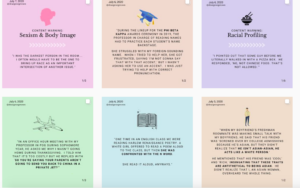Editor’s note: Some names in the article have been changed to protect the anonymity of sources.
Joel Bossous (CAS ’23) has been an intern at the Georgetown University Alumni and Student Federal Credit Union (GUASFCU) for as long as he has been a Hoya. Now, drawing on his eight semesters in the credit union, he’s calling for structural and cultural change.
On Dec. 23, 2022, Bossous sent a nearly nine-page open letter to all active interns in GUASFCU, voicing serious concerns regarding the anti-Blackness embedded in the club’s culture and its lack of diversity, equity, and inclusion. The letter, which was obtained by the Voice, reflects Bossous’ experience at the credit union, including one year as an executive, as well as the concerns of numerous current and former interns, many of whom are students of color, who have confided in him over the years.
One of the letter’s primary concerns was the credit union’s consistent failure to recruit and support its Black and Latino interns. Bossous, who served as the president of Georgetown’s National Association for the Advancement of Colored People (NAACP) chapter from 2021-22 and is currently the co-president of the Black Student Alliance (BSA), cited GUASFCU’s lack of sustained and meaningful outreach to affinity organizations as resulting in a lack of diversity in their teller classes. Despite the credit union’s reported overall high retention rate, Bossous’ letter noted that the majority of interns who left the organization were Black.
“Despite more popular affirmations that the credit union ‘strives to create an inclusive environment,’ ‘promotes diversity,’ is ‘looking forward to creating a community that makes everyone feel comfortable, valued and included,’ and ‘has opportunities for everyone,’” Bossous wrote, “GUASFCU is incredibly off the mark and has actual work to do—not merely work we say needs to be done.”
“So much of [GUASFCU’s] commitments to diversity and inclusion have been performative at best,” Sara, who commented anonymously, wrote to the Voice. The intern, who has been in the credit union for the last three years, wrote that Bossous’ letter deeply resonated with her as a person of color.
The lack of support for Black interns is reflected at the organization’s highest levels of leadership. Bossous noted in his letter that during the 2021-22 board term, he was the only Black executive out of 26 available positions: nine C-suite members of the board of directors and 17 auxiliary executives who report to them. Bossous described that since joining the credit union in 2019, he has counted only five Black interns, including himself, who have held leadership roles, none of which were C-suite positions (the letter was sent before 2023-24 Board elections and does not reflect those officers).
In response to his letter, the 2022-23 board of directors met with Bossous on Jan. 4 over Zoom, but he is not confident that they will take the steps toward inclusion that he has suggested. Only six of the nine members of the board were present, which signaled to him that they did not take his concerns seriously.
“While grateful to them for taking the time, I went into the meeting with little to no expectations,” Bossous said in an interview with the Voice. “As much as I was waiting for them to impress me with a meaningful response, I was not holding out hope for very long.”
In Bossous’ view, the board repeated a familiar strategy: issuing commitments to diversity and inclusion, yet neglecting actionable follow-through. Bossous advocated in his letter for meaningful actions that demonstrated the credit union was capable of more than paying lip service to values of diversity and inclusion, as it has done in the past.
Many of the letter’s concerns reflect the long-standing cultural issues that have affected GUASFCU since before many of its current interns joined. The credit union is no stranger to allegations of toxic behavior within the workplace. In 2017, a GUASFCU intern took issue with the persistent whiteness of the new class of tellers and the “beauty contest” recruitment process. Senior Hoyas might recall the misconduct scandal involving 2019-20 CEO Kuran Malhotra (MSB ’20), whose ascension to C-suite was enabled by old board members who knew about yet chose to overlook his misconduct allegations. In January 2022, an intern in the class of 2022 wrote a letter to the freshly elected 2022-23 board of directors, urging them to do greater outreach toward students of color. Bossous, who was consulted by that intern a year ago, drew on those recommendations in his own advocacy.
Bossous’ letter advocates for organizational transparency with its past scandals to bridge the institutional memory gap. “GUASFCU shoulders the burden and responsibility of keeping its interns fully informed, even if that involves less palatable issues and uncomfortable conversations about workplace misconduct, a history of nepotism in recruitment, or, as much as we claim to value the opposite, a culture of exclusivity,” he wrote.
GUASFCU’s hiring practices have historically enabled subjectivity and favoritism in determining who is accepted into the club, according to Boussous. The letter criticized the timeline of GUASFCU’s application cycle in fall of 2022, arguing that its decision to hold first-round interviews during CAB fair instead of tabling privileged first year applicants who already knew about the organization before matriculating.
“When we make a hiring decision, it is a unanimous decision between all nine members of the board of directors, plus the executives from Human Resources and Community Engagement,” a representative from the 2022-23 GUASFCU Board explained in an interview with the Voice.
Bossous and an intern who spoke with the Voice under the condition of anonymity thus see the lack of diversity in GUASFCU leadership as contributing to a cyclical lack of diversity in teller classes.
Jordan, who previously served as a GUASFCU executive and commented on the condition of anonymity, highlighted several flaws with the hiring process in their support for Bossous and his letter. “I agree that the hiring practices lack standardization and at times sensitive consideration,” Jordan wrote, reflecting on their time conducting recruitment interviews during the 2021-2022 cycle. “And when the deliberation room lacks diversity, pulling more in can be an uphill battle.”
This year, the credit union started to phase in some of those hiring reforms. In the fall 2022 recruitment cycle, GUASFCU introduced a rubric to standardize its interview process and held a bias sensitivity training ahead of interviews. “We believe that having some sort of numerical tie to our interviews helps make sure that we can limit bias as much as possible,” a representative from the executive board explained.
Bossous, however, was not particularly impressed by the results of this step, especially given the length of time it took the board to implement rubric-based hiring. Bossous mentioned that standardizing interviews was proposed as early as 2020 but was not realized until last fall. “The credit union has made these changes with negligible results,” he said. “There is not a big difference in the demographics of the new [fall 2022] intern class, so the question that should arise is: What should we do better?”
During fall recruitment, GUASFCU also introduced a networking event for students of color. “We have started a tea time program during recruitment for interns of color, allowing them to ask other interns of color about their experiences as an open and honest conversation,” the board stated. “This is part of our overall initiative to build a stronger sense of community for our organization.”
The board noted that these policy changes are not universally shared, however. “Although these changes and conversations happen at the board level, they’re not always communicated to the rest of the organization,” the board explained. “While we’re putting in the work and putting in the hours, it’s contained to a small subset of people who are aware of this.”
Bossous’ letter interpreted this dynamic as a systemic lack of transparency around the credit union’s efforts, even within the organization itself. One of the problems with creating institutional change in an organization staffed by college students is the unavoidable turnover rate that occurs with graduation. Long-term cultural and structural shifts are difficult when frequent personnel changes lead to institutional inertia, which is why Bossous emphasized the need to keep GUASFCU’s new teller classes informed of its organizational history.
The credit union recently established affinity group Slack channels for interns of color, and LGBTQ+ interns as well. While there are groups for women of color, Latino, and South Asian interns, Bossous confirmed there is no organized space for Black interns specifically. Moreover, whereas GUASFCU’s comments to the Voice represented interns of color collectively, Bossous’ letter took special concern for the experiences of Black and Latino interns in the credit union. In the most recent teller classes, Black and Latino interns have been less represented than other non-white racial groups.
“What credit union leadership has tended to do is to confront issues without exploring the complexities of the issues themselves,” Bossous explained. “They use the language and the vernacular of ‘We hear you’ to anyone who is not white. But not all interns of color’s experiences and issues are the same. My experience of being Black is not your experience of being Asian. The nuances of being non-white cannot be addressed in one fell swoop of ‘interns of color.’”
The credit union’s long-standing reputation as a deliberately exclusive group has hindered its current efforts toward inclusivity. GUASFCU has reached out to Black affinity groups for guidance, but according to leaders in these groups, the credit union seems to lack an understanding of the role they aim to play on campus.
“It’s not the job of Black student groups to solve the inclusion issues of Georgetown clubs,” a senior member of one of these organizations, who spoke on condition of anonymity, said. In their view, Black student groups at Georgetown are concerned with building community spaces for Black Hoyas, not with solving the anti-Blackness of other clubs.
Bossous’ letter enumerated concrete recommendations as well as concerns. He suggested that at minimum, the credit union host targeted information sessions during recruitment with groups that serve marginalized students, such as BSA, Latinx Leadership Forum, the Georgetown Scholars Program, and the Center for Multicultural Equity and Access. He also recommended yearlong partnerships with other finance and banking groups at Georgetown, such as Georgetown Aspiring Minority Business Leaders & Entrepreneurs and BlackGenCapital, to help teach financial literacy to more students on campus. These suggestions aim to expand GUASFCU’s outreach to historically underrepresented students, working against its reputation as an exclusive, fraternity-like group.
Bossous explained that he pitched these ideas while applying to work as part of GUASFCU’s summer crew in 2022. However, he was not chosen for that role, and the ideas were not implemented.
Regarding the structure of GUASFCU’s leadership, Bossous called for the creation of a chief diversity officer (CDO) position to lead and oversee diversity and inclusion efforts. While wary of tokenizing the few interns of color in the credit union, Bossous explained that the creation of this position would ultimately help alleviate some of the strain on the chief communications officer, a board of directors executive who oversees three other credit union operations in addition to diversity and inclusion.
Despite having had discussions about creating a CDO position for the past two years, the GUASFCU board said that it hasn’t fully envisioned what the role would look like in terms of how it would work with other board positions or what departments would fall under it.
“It’s a position that we know we want to add at some point. But we want to make sure that when it is implemented, it is implemented correctly,” the board commented. “We didn’t think it was the right time to institute a CDO position on the board.”
While the Board has met with external consultants, such as a Georgetown graduate student who specializes in diversity, equity, and inclusion in the workplace, its members do not expect the CDO role to be instituted anytime soon. “If we decide to do so in the future, we want to do so in a way that is not rushed or tokenizing, and the timeline this year did not give us the opportunity to proceed in that way,” they said.
Past structural reforms that targeted diversity and inclusion have been short-lived in Bossous’ experience with the credit union. In 2020, in the wake of the murder of George Floyd and the national attention spotlight on the Black Lives Matter (BLM) movement, GUASFCU established three standing committees aimed at improving equity in recruitment and creating a more inclusive culture. These committees achieved some success––for example, they eliminated the resume requirement in GUAFSCU’s application––but have since been dissolved. According to Bossous, after the initial momentum of BLM ebbed, GUASFCU’s efforts to diversify their organization faded as well.
Last fall, the credit union held an Inclusive Leadership Strategy Session to open conversations around DEI initiatives in the organization. Now, as a new board begins its leadership term, the organization is once again facing calls for movement on those plans and vision statements. Bossous and others believe that although it will require constant evaluation and risk-taking to define what the path forward looks like, action is the first step.
“We are unmoved by the keywords and catchphrases, the jargon, and the language of change without its production,” Bossous wrote.




